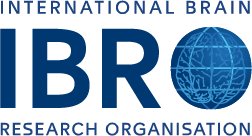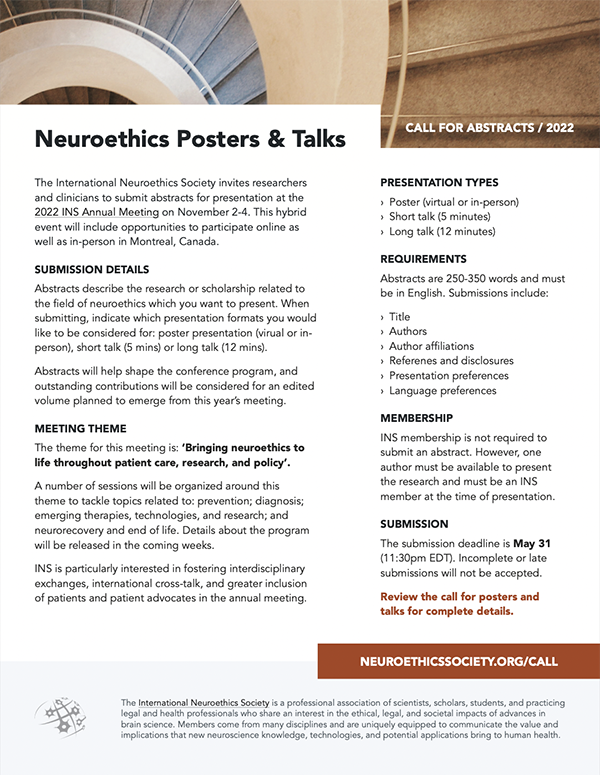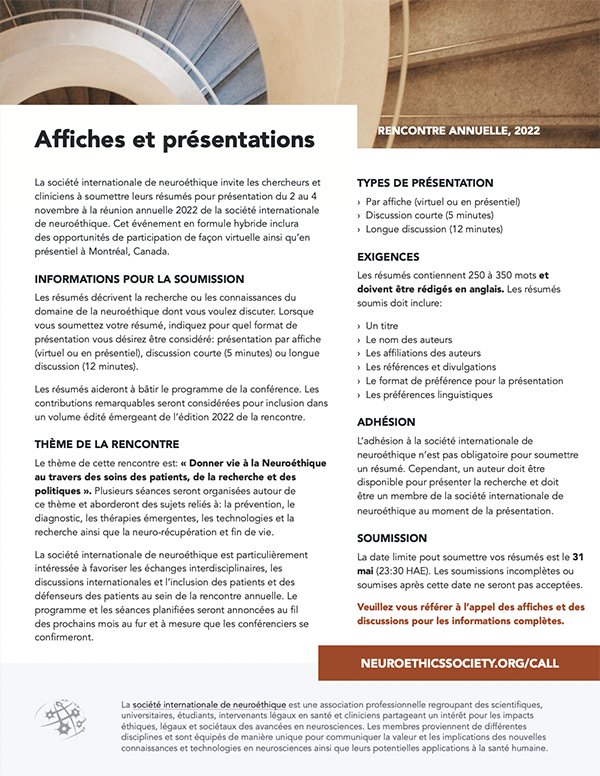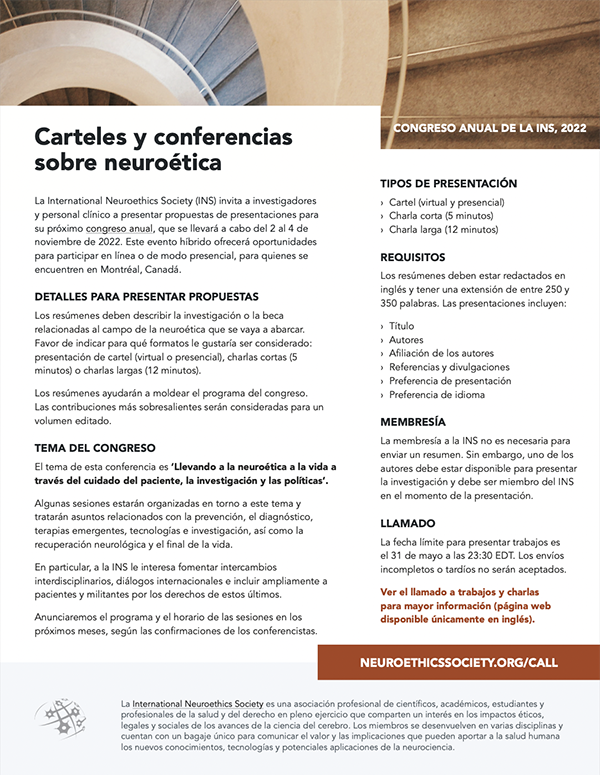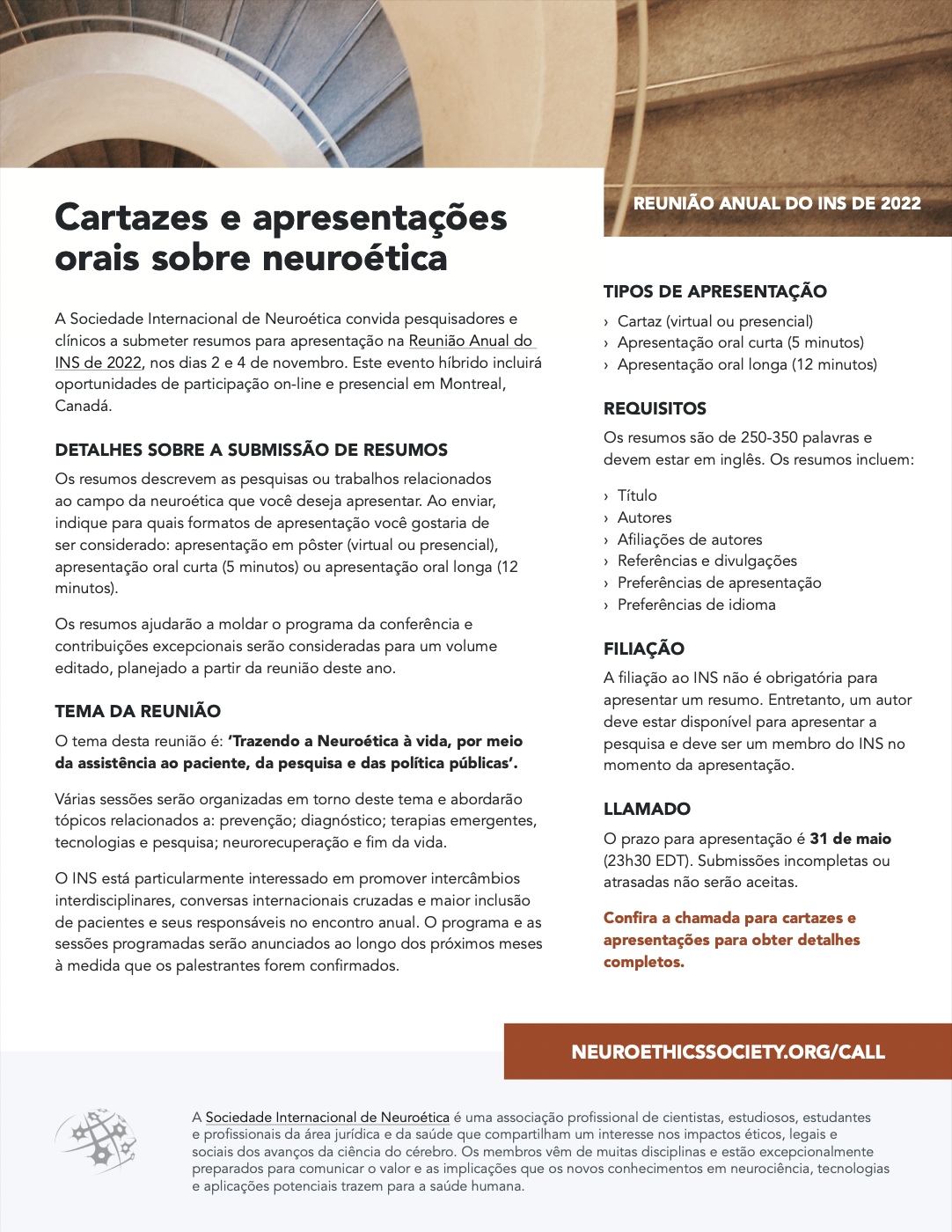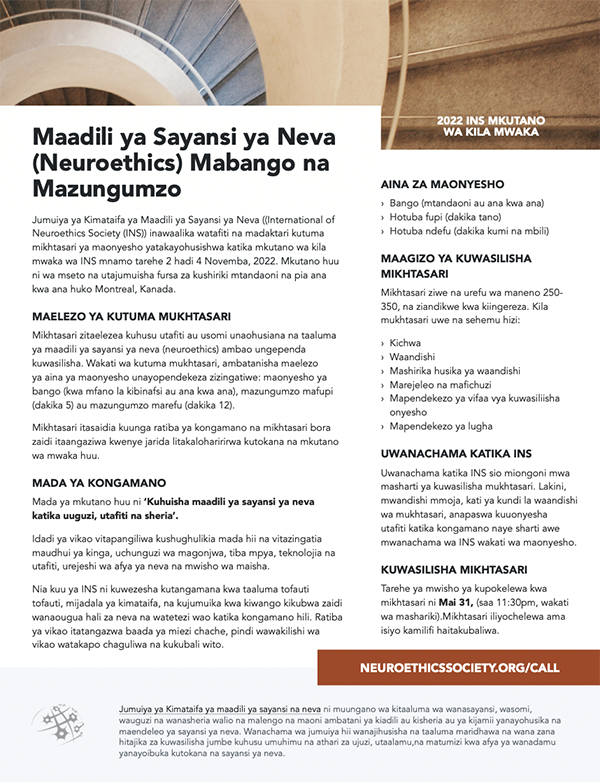Call for Posters and Talks (Abstracts)The International Neuroethics Society (INS) invites researchers and clinicians from around the world to submit abstracts for presentation at the 2022 INS Annual Meeting on November 2-4. The hybrid meeting — expected to include online and in-person opportunities — will take place in Montreal, Canada at the Institut de recherches cliniques de Montréal (IRCM). Abstracts are 250-350 words and must be in English. Abstracts describe the research or scholarship related to the field of neuroethics which you want to present. When submitting, indicate which presentation formats you would like to be considered for: poster presentation, short talk (recorded or live), or long talk (grouped with other investigators as part of a session). Abstracts will help shape the conference program, and outstanding contributions will be considered for an edited volume planned to emerge from this year’s meeting. The final submission deadline has passed. See the review section below for important upcoming dates regarding decisions of acceptance and invitations to present. ThemeThe theme for this meeting is: ‘Bringing Neuroethics to Life Throughout Patient Care, Research, and Policy’. A number of sessions will be organized around this theme to tackle topics related to: prevention; diagnosis; emerging therapies, technologies, and research; and neurorecovery and end of life. Details about the program will be released in the coming weeks. Programming and sessions will examine the practical applications and value of neuroethics across dimensions of healthcare, neuroscience research, and public policy. INS is particularly interested in fostering interdisciplinary exchanges, international cross-talk, and greater inclusion of patients and patient advocates in the annual meeting. Outstanding contributions from submitted posters and talks will be considered for inclusion as a published chapter in an edited volume planned to emerge from this year’s meeting. Opportunities for InvestigatorsThe 2022 INS Annual Meeting is an exciting opportunity to share your research and scholarship with international colleagues who are actively aligning ethics, healthcare, philosophy, law and policy with advances in neuroscience. We welcome abstracts related to the field of neuroethics from any disciplinary background, using any methodological approach. Abstracts are encouraged to align with the theme of this year's meeting, but this is not required. Investigators at all career stages are eligible to submit abstracts for consideration and to serve as the lead author for up to two (2) abstracts. We especially welcome abstracts from our colleagues from marginalized groups and/or with perspectives that are underrepresented in the field — including women, people identifying as LGBTQIA+, people with disabilities, and investigators working in or originating from Africa, Latin America, and Southeast Asia. We encourage a broad dissemination of this call so that people interested in neuroethics but not yet members of the Society have an opportunity to submit an abstract and share their research. The INS annual meeting features a wide range of exciting discussions with a focus on fostering networking opportunities among individuals with diverse expertise and emerging leaders in the field of neuroethics. The 2022 meeting will be held in Montreal and the INS is also organizing a series of online sessions and activities to ensure the event is as widely available as possible. Members of the INS Program Committee are currently planning sessions and activities. Presentation FormatsInvestigators who submit an abstract are eligible for opportunities to present their work physically in Montreal or to participate online. Be sure to indicate your preference for in-person and/or virtual presentation when submitting your abstract. Please be aware that in-person presentation capacity is limited and may need to change to accommodate an online-only event. Abstracts describing your research or proposed discussion topic may be considered for one or more of the following presentation formats. Regardless of presentation type, all abstracts must meet the same requirements outlined below. Authors must indicate their interest in each of the following presentation formats or available recognitions when submitting their abstract. Poster Presentations – Both in-person and virtual poster sessions are planned. All authors with accepted abstracts will be invited to present their work as a poster presentation if they are not retained for a long or a short talk. Presentation requirements and instructions — such as poster size and preferred file types — will be provided at a later date. Short Talks – A sizeable number of authors will be invited to give a short oral presentation of their work (approximately 5 minutes). Invitations will be made on the basis of abstract topic, quality of submission, and with consideration for giving a platform to junior and underrepresented scholars. Authors who are selected for a short talk will not be expected to submit a poster. Details about this presentation format will be released at a later date. Long Talks – A select number of authors will be invited to give a longer oral presentation of their work (approximately 12 minutes). Invitations will be made on the basis of abstract topic, quality of submission, and with consideration for giving a platform to junior and underrepresented scholars. Details about this presentation format will be released at a later date. RecognitionStipends – Registration discounts and travel stipends are awarded competitively based on the availability of funds and the quality of abstract submission, as determined by the Program Committee. You must submit an abstract and have it accepted to be eligible to receive this support. Please indicate that you would like to be considered for a registration discount or travel stipend when submitting an abstract. See the list of available stipends and eligibility requirements. Awards – Abstract submissions of any form are eligible to receive awards. We have historically given awards for top abstracts, talks, and posters determined by a panel of judges. Publishing – Outstanding submissions will be considered for inclusion as a published chapter in an edited volume planned to emerge from this year’s meeting. To be eligible, authors must indicate their interest in the abstract submission form. AJOB Neuroscience editors have also historically recognized a list of top abstracts and featured them in a journal issue. RequirementsAll abstracts must be received through the abstract submission form by the deadline listed in the submission instructions below. Incomplete or late submissions will not be accepted. All submissions must include:
The Program Committee will review abstracts based on separate scoring criteria for empirical abstracts and for conceptual / theoretical / normative abstracts. See the writing tips provided for authors. Writing TipsINS Membership You do not need to be a member of the International Neuroethics Society (INS) to submit an abstract to the 2022 INS Annual Meeting. However, at least one author must be available to present the abstract (either virtually or in person) and must be an INS member at the time of presentation. All authors who plan to present a poster or give a talk must confirm their participation and register for the meeting by September 15. Compliance / Disclosures Work presented in abstracts must be in compliance with: local policies, ethical review related to the use of humans and animals in research, and disclosure of any conflicts of interest. Authors are responsible for reporting any real or perceived financial conflict of interest. A brief disclosure and conflict of interest statement should be submitted with the abstract and viewable on the presentation. Disclosures should appear on the bottom left corner of the poster, or on a presentation slide, and may follow the recommended format:
SubmissionThe final submission deadline has passed. See the review section below for important upcoming dates regarding decisions of acceptance and invitations to present. Review / NotificationsAbstracts are reviewed by members of the Program Committee and their appointees from within the Society. Selected submissions will subsequently be considered for inclusion as a published chapter in an edited volume planned to emerge from this year’s meeting. The committee will select outstanding abstracts to receive special recognition at the 2022 INS Annual Meeting. The committee does not provide feedback to abstract authors regarding final decisions. Submitting authors can expect to receive notices of acceptance by July 25. All authors with accepted abstracts will be invited to present their work as a poster presentation if they are not retained for a long or a short talk. Updates regarding stipends, recognitions, or invitations to give an oral presentation will be sent by August 10. StipendsIBRO is contributing €3,000 (EUR) for travel costs and registration. Funds from IBRO are available for people attending: 1) minority-serving institutions in the United States; or 2) non-U15 Universities in Canada; or 3) people who reside, study, or work in under-resourced countries -- defined as low- and middle-income economies by the World Bank. Attendees receiving a stipend from IBRO must write a brief statement (about 200 words) about what they gained and accomplished by participating. These funds are only available for investigators with an accepted abstract who will be participating in the meeting, with preference going to investigators attending in person. The Wellcome Centre for Ethics and Humanities at the University of Oxford is contributing $1,174 (USD) for travel costs. These funds are only available for investigators with an accepted abstract and who will be attending to give talk or poster poster presentation. The Department of Medical Ethics & Health Policy at the University of Pennsylvania is contributing $1,000 (USD) for travel costs. These funds are only available for investigators with an accepted abstract and who will be attending to give talk or poster poster presentation. The Neuro is contributing $1,000 (USD) for travel costs and registration. These funds are only available for investigators with an accepted abstract and who will be attending to give talk or poster poster presentation. Neuroethics Canada is contributing $500 (USD) to support two scholarships for women to attend the in-person meeting in Montreal. Preference will be given to scholars who reside, study or work in an under-resourced country or location. These funds are only available for investigators with an accepted abstract and who will be attending to give talk or poster poster presentation. You must submit an abstract and have it accepted to be eligible to receive support. Indicate that you would like to be considered for a registration discount or travel stipend when submitting an abstract. Investigators do not need to separately apply for stipend funds. INS staff will contact investigators if they are awarded a stipend. About the INSThe International Neuroethics Society is a professional association of scientists, scholars, students, and practicing legal and health professionals who share an interest in the ethical, legal, and societal impacts of advances in brain science. Members come from many disciplines and are uniquely equipped to communicate the value and implications that new neuroscience knowledge, technologies, and potential applications bring to human health and wellbeing. Join the Society to interact, learn, and participate in critical neuroethics discussions that further this growing field. MembershipSponsorshipMake a donation to support the INS annual meeting and fund travel stipends. Donations of all sizes are welcome. If your institution or organization would like to be a sponsor, contact Karen Graham ([email protected]). Share This Call
Flyer / Polycopié / Póster / Folheto Posts
|

